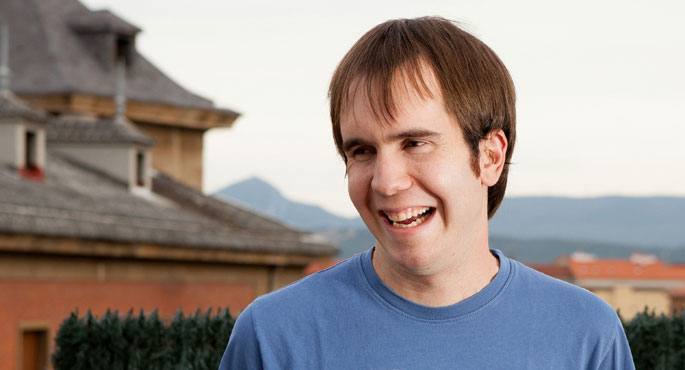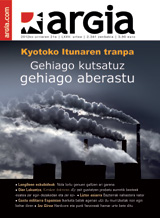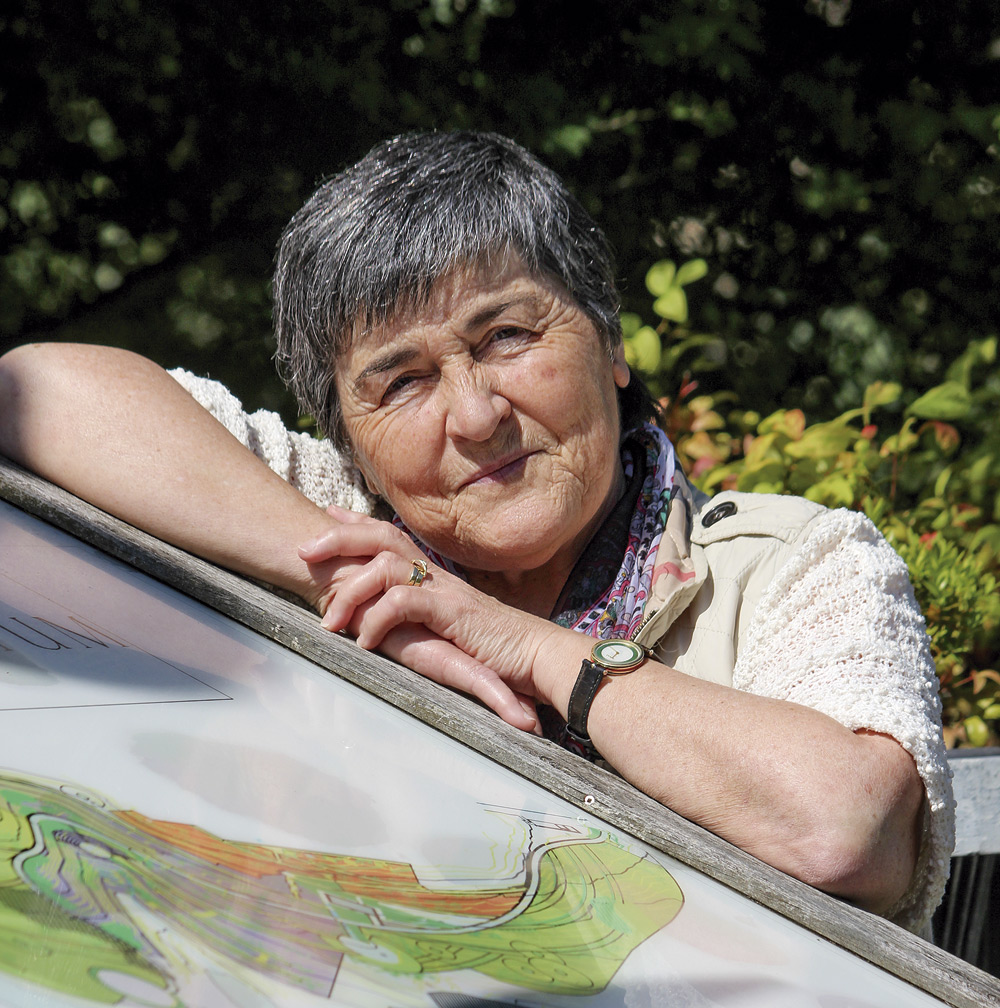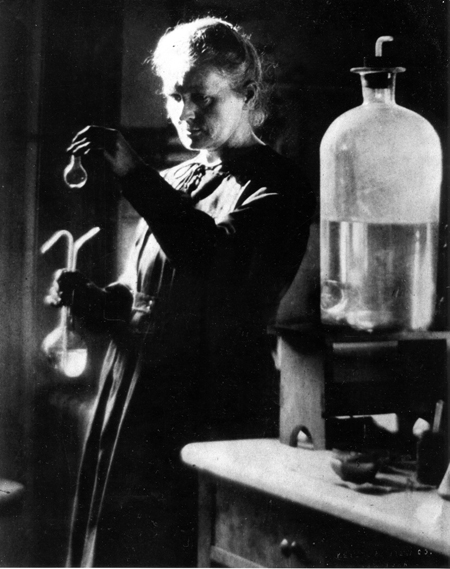"The biggest obstacle we put ourselves in is thinking there's nothing to do."
- High level scientist, recently a PhD in Theoretical Chemistry, bertsolari… Oier, despite having lost his sight and having diminished his ear, is exceeding the steps of life.

What is theoretical and computational chemistry?
There are two ways of researching chemistry: one in the lab, through experiments, and one in the lab, and one in the lab, which is done by computer. In the latter, based on the laws or principles of quantum mechanics followed by electrons, chemical systems are theoretically analyzed through approximations.
What exactly does the thesis do?
I've been researching methane activation. Today, this is a major challenge of chemistry, as methane is mainly used in energy production and, if activated, other uses such as molecular hydrogen or valuable and useful organic compounds could be obtained. When you burn the methane, you release CO2, and if you activate the methane, you get molecular hydrogen, which by burning it doesn't produce CO2, but water. Therefore, the environmental impact would be much smaller. Your interest.
Use the computer. How do you manage without seeing the screen?
I use a normal computer; what I need, like other blind people, is a screen reader. It is a special programme and instead of seeing it. I have no problems writing. After all, I know the keyboard, because I know typing.
What happens from now on, once the thesis is finished?
I'm open. I'd like to focus on outreach, but today, because of the crisis, that's very difficult. I don't rule out teaching, teaching at university. However, perhaps now the most feasible thing is to conduct a post-doctoral course. Spend a year or two, perhaps in Tarragona. There I made a three-month stay in 2010, I know my team and I took it very well.
Do you abandon the idea of going abroad?
As far as the ear is concerned, I have great difficulty with English. I manage to talk to people, also to write, but I find it hard for people to understand when they speak English. But I don't rule it out. If it is not possible to go to Catalonia, perhaps I would be encouraged to one of those places in northern Europe, where the social level is highly developed and perhaps I could receive aid for learning and for everyday life. I'm willing to spend a year or two outside, but I see myself here in the Basque Country.
In outreach work with the Elhuyar Foundation?
I had a contact a year and a half ago and they were also interested, but since then the crisis has hit them hard and they have to see them. I would like, because for the Basques Elhuyar is a reference, but at the moment everything is in question.
What is your physical limit?
At age 5, I was diagnosed with Wolfram syndrome. This leads, among other things, to loss of visual and auditory nerves. Little by little I've been losing my sight until I became blind and also lost my ear. I also have two types of diabetes: diabetes and insipidus. Because of the latter, the body cannot maintain fluids and one of its consequences is the presence of a neurogenic bladder. This means that the bladder does not respond to the nervous system and it creates problems for me to urinate.
When you're 26, that's going to be tough ...
Fortunately, I have assimilated it quite well and I have been answering it, but it is true that every time one of these problems arises, it has a certain decrease. At first it was diabetes, then the ear and the vision… The loss has been progressive and that has helped me get used to it and use new resources, but sometimes it is a little strong. From the auditory point of view, I adapt to the devices to talk to another person. I have more problems when there's more people or when there's noise. For example, after lunch or dinner, I have no problem listening to the neighbor, but I do have to listen to those who are far away.
Is it really hard to lose sight?
I've seen a lot of things, and it wouldn't change everything I've seen for nothing. I have some specific references. I know what things are like, and that's a great help.
Hope for visual recovery?
Today, there is no chance of regaining sight and hearing. Research is under way, but there is nothing. The aim is to maintain hearing as much as possible.
Are you like a superman?
No! I have always said that on those occasions there are two options: to be looking at the past and to feel nostalgia or to try to lead a life as best as possible by accepting another attitude that I have chosen and facing the problems.
This has touched me, and I have to learn how to deal with it. The first step is to accept it. From there we can overcome the problems, and for that we must help others, no doubt. Maybe I can't do everything I want, but after trying it I'll see it already.
Sometimes you've had to deal with prejudice. At the University of Opus in Navarra, for example.
I've always loved chemistry a lot and I wanted to try it out. I had a lot of doubts and, furthermore, when I went to college on open-door days, the Vice-Dean there told me that I was not recommended at all to do chemistry. Admitting that it was going to be difficult, I wanted to prove it. I wanted to see it myself. They welcomed me when I saw that I was stubborn and I made the career.
They have also had to go to court for the possible incompatibility between disability pensions and scholarships.
When I was a student, my parents were getting financial help because of my disability. When I started doing the PhD, I started to get that pension directly, and on the other hand, I got a research scholarship. After approximately two and a half years, they said that they had to repay the amount of disability pension they had received since the start of the grant for a total amount of EUR 11,000. It did not seem fair to us and we decided to go to court. Then the Social Security acknowledged that the first year was for me, because the first years of the scholarship are scholarships, not a work contract, and therefore they are compatible. In the third and fourth years, the scholarship is made in the form of a contract, so it is said that it should return the pension for that period, around EUR 1,600. We continue to say that they should be compatible and the outcome of the February trial was favourable. The judgment was appealed and it is precisely today’s news [2 October] that it has not been admitted and that gives us reason.
Do laws make invalids more vulnerable?
Yes. And it seems that the problem goes further. As things stand, it seems that the disabled cannot be workers. We seem to spend disability pensions on whims, and that is not the case. It is to meet the other costs of the disease that we suffer: payment of medicines, buying hearing aids from time to time… And you also need a salary to live.
This society, in general, is not pressed for people with disabilities…
No. I use the computer and the mobile phone, but the tablets that are being created and all those tools, for example, are not designed for us.
One of my objectives, and one of the weakest points, has always been to learn how to develop myself on my own. For the past four years, I've lived in San Sebastian for the week in a residence close to university and I've managed well. This last year, on the other hand, as I write the thesis, I worked from home and twice a week I went to Donostia.
In this sense, my three-month stay in Tarragona was a stimulus for me: I lived alone in an apartment, I did all the things at home on my own and that was very important to me: if I worked a little, it helped me to verify that I could do all that.
Besides bertsolarism, what other hobbies do you have?
I like to be with my friends, turn around... I'm a little limited by this insipid diabetes, but I really like to go and walk down the mountain. When I have occasion I am happy to go. I love listening to the radio. I also like to read. I have used very little braille, I use the reading computer and the audio books.
Today, many young people are concerned about the lack of work, about the economic situation. What would you say to them?
When people who have lived comfortably have a difficulty, it is normal that they sink a little and shrink. I believe that, as far as possible, we have to deal with it and I would encourage people to try to overcome it in the face of difficulties. The biggest obstacle we put ourselves in is thinking that there is nothing to do. If we believe in our possibilities and strive, we will be able to overcome many obstacles.
Iruñea (1985-12-29). Guraso sakandarren semea, Oierrek Paz de Ziganda ikastolan eta Iturrama institutuan ikasi ondoren, Nafarroako Unibertsitatean Kimika karrera egin du. Orain berriki EHUn euskaraz eginiko doktore tesia defendatu eta gainditu egin du cum laude klasifikazioarekin. Honainoko bidea ez da zelai eta goxoa izan, Oierrek Wolfram gaitza duelako: horren ondorioz ikusmena galduz joan da, eta duela zazpi urte erabat itsu gelditu zen. Entzumena ere kaltetua du eta audifonoen bidez moldatzen da bizimodu ahalik eta normalena egin ahal izateko.
Oier Lakuntzari ordenagailuak hitz egiten dio. Guk pantailan ikusten duguna hitz bihurtzen dio. Hau eromena! Ziztu bizian robot batena dirudien ahots mekanikoak hamaika letra eta ikur deskribatzen dizkio erretolika zibernetiko amaigabean. Goi mailako zientzia kontuetan, halere, ez omen da oso iaioa makina, eta kimika teorikoaren formulak deskribatzerakoan lan bikoitza ematen dio, ikerlanak egiterakoan. Hala ere, ezinbesteko laguna du eta elkarrekin gauza asko egiten ari dira.
Irailaren bukaeran Oier Lakuntzak bere tesiaren defentsa egin zuen, Pedro Miguel Etxenike fisikari ezaguna buru zuen epaimahaiaren aurrean. Etxenikek “zorionak doktore Lakuntza!” esanez agurtu zuen Oier Iruñerriko Euskalerria Irratian eginiko elkarrizketan. Fisikari izabarrak Oier Lakuntza goi mailako kimikaria dela nabarmendu zuen eta horren lekuko direla nazioarteko zientzia dibulgazio aldizkari nagusietan argitaratu dituen artikulu bikainak. Epaimahaiburuak azaldu zuenez, cum laude kalifikazioa eman zioten “oso lan ona delako, laburra eta ongi idatzia. Azalpena ere bikaina izan zen”. Bukatutakoan Lakuntzak eskerrak bertsotan eman zizkien eta Etxenikek hari erreplika emateko Maialen Lujanbio bertsolaria gonbidatu zuen.
In the striking canvas of research and the academic world, the brushes of gender equality not only paint a picture of justice, but also sculpt the essence of knowledge. On the occasion of World Africa Day on 25 May, it is essential to recognise the fundamental role of African... [+]
Izabarrak zientziari egindako ekarpenak ikusarazteko helburuz publikatu du Nafarroako Gobernuak, haren jaiotzaren mendeurrenaren harira. Izabako Alaba Kutun izendatu dute.
Kataluniako kimika ikerketen institutuan (ICIQen alegia), arlo ezberdinetako hogei bat ikerketa talde inguru daude. Institutuaren helburu nagusia prozesu katalitiko berrien garapena lortzea da.
Zientzia eta guda gizonezkoen alor esklusiboak ziren XX. mendearen hasieran. Espresuki debekatuak zitzaizkien emakumezkoei, neskametzarako edo gizasemeen menpeko lan anonimoetarako ez bazen behintzat.

















